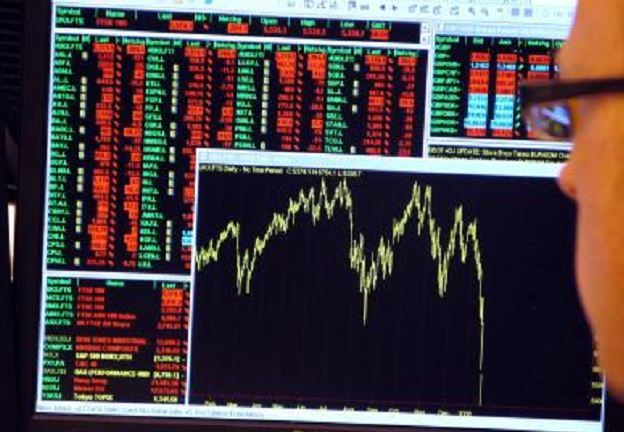
Emerging-market stocks headed for their first decline in five days as energy producers dropped with oil and concern grew over the outlook for the global economy. The Malaysian ringgit paced losses for developing-nation currencies.
The MSCI Emerging Markets Index decreased the most in a week, with nearly two shares falling for each one that gained. PetroChina Co. and Cnooc Ltd., China’s largest listed oil producers, slid for a second day in Hong Kong.
The ringgit declined after Swiss authorities said it’s pursuing an investigation into alleged diversion of funds from a Malaysian state-investment company. The Shanghai Composite Index climbed after the central bank injected cash into the financial system before next week’s holidays.
Oil prices have erased last week’s rally on speculation U.S. stockpiles are continuing to expand amid a global glut. Developing-nation stocks are retreating from the biggest four-day gain since October as optimism that global central banks from Japan to Europe are ready to do what’s needed to spur growth faded. The Reserve Bank of India left the benchmark interest rate unchanged at this year’s first policy meeting, as expected by most economists in a Bloomberg survey, after lowering them four times in 2015.
“It’s still a volatile market,” said Rafael Palma Gil, a Manila-based trader at Rizal Commercial Banking Corp., which oversees about $1.8 billion in assets. “While central banks have become relatively more accommodating, this stance doesn’t remove the concern of a global economic slowdown, with the weakness in China.” Rizal Bank is buying stocks on declines and selling the rallies, Gil said.
The emerging-markets equity gauge fell 0.7 percent as of 1:37 p.m. in Hong Kong as all 10 industry groups retreated, led by energy and consumer-discretionary companies. The gauge rallied 4.9 percent in the previous four days on signs the U.S. Federal Reserve won’t raise interest rates this quarter and as the Bank of Japan adopted a negative interest rate policy.
Cnooc and PetroChina slid at least 1.1 percent in Hong Kong, while SapuraKencana Petroleum Bhd declined 6.4 percent in Kuala Lumpur after U.S. crude prices plunged 6 percent on Monday. The Hang Seng China Enterprises Index fell 0.9 percent, while the Shanghai Composite Index jumped 2.2 percent.
The People’s Bank of China will inject 100 billion yuan ($15 billion) into the banking system using reverse repurchase agreements on Tuesday, according to two traders at primary dealers required to bid at the auctions, as demand for cash rose in the run up to the lunar new year holidays.
The Malaysian ringgit fell 1.4 percent, the most among emerging-market currencies, as Singapore seized bank accounts related to possible money laundering associated with 1Malaysia Development Bhd. That followed the Swiss Attorney General’s announcement last week that it’s pursuing an investigation into alleged diversion of funds from 1MDB. The local markets reopened after a public holiday on Monday.
A Bloomberg gauge of 20 developing-nation currencies slid 0.2 percent, after losing 1.5 percent in January. The Mexican peso weakened 0.5 percent as traders pulled money from the nation’s biggest exchange-traded stock fund at the fastest pace in seven months.
The Indian rupee slipped 0.1 percent after the central bank left the repurchase rate at 6.75 percent. Forty-two of the 44 economists in a Bloomberg survey expected no change in borrowing costs, while two predicted a reduction.
China’s overnight repurchase rate, a gauge of interbank liquidity, dropped to a one-week low after the central bank injected cash.
South Korea’s three-year sovereign bond yield fell to an unprecedented 1.52 percent amid speculation that the Bank of Korea will cut interest rates to support growth in Asia’s fourth-largest economy. Official data on Monday showed the nation’s exports contracted for a 13th month in January.
Recommended for you
